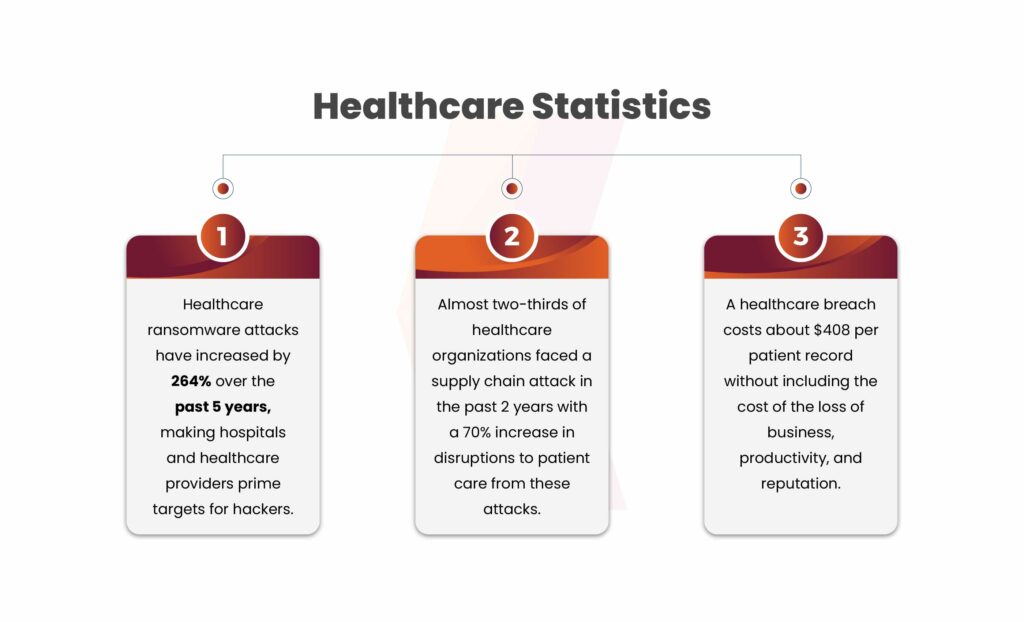
2024-9-20 14:16:28 Author: securityboulevard.com(查看原文) 阅读量:4 收藏
The healthcare industry’s swift embrace of digital technologies is revolutionizing care delivery, but it also introduces new and potentially harmful cyber threats that could disrupt operations and jeopardize patient safety. As a result, cyber security in healthcare has become essential, playing a crucial role in protecting sensitive patient information and ensuring that healthcare services remain resilient.

Healthcare ransomware attacks have surged by 264%, with breaches costing an average of $10.10 million. Over 93% of healthcare organizations have experienced breaches, yet they allocate just 4-7% of their budget to cybersecurity. Medical devices also present significant risks, with many vulnerabilities, and hospital administrators often feel unprepared for cyber threats.
What is Cyber Security in Healthcare?
Healthcare cybersecurity is a critical priority for organizations across the medical industry, including biotechnology firms, insurers, healthcare providers, pharmaceutical companies, and medical device manufacturers. It encompasses a variety of measures to protect against internal and external cyber threats, ensure the availability of medical services, safeguard patient data, maintain the functionality of medical systems and equipment, and ensure compliance with industry regulations.
Information security and cyber security in healthcare are essential for the smooth operation of any business. Healthcare organizations, in particular, rely on specialized hospital information systems such as:
- E-prescribing systems
- Electronic Health Record (EHR) systems
- Practice management support systems
- Radiology information systems
- Clinical decision support systems
- Computerized physician order entry systems
Why Cybersecurity Matters in Healthcare?
Healthcare delivery organizations—such as hospitals, urgent care clinics, and doctors’ offices—depend heavily on digital technology for various clinical, diagnostic, and administrative functions. This technology is crucial for the smooth operation of essential healthcare infrastructure, including power, HVAC, and communication systems. Additionally, the integration of medical IoT devices, or the Internet of Medical Things (IoMT), further connects and enhances digital infrastructure.
However, this extensive use of digital technology introduces numerous hardware, software, and cloud services that are vulnerable to cyberattacks. Hackers targeting these systems may aim for financial gain, disrupt healthcare services, or pursue other malicious objectives. Therefore, robust cybersecurity is essential for maintaining the integrity and continuity of healthcare delivery.
Book a Free Consultation with our Cyber Security Experts

Role of Cybersecurity in Healthcare Laws and Regulations
Government and industry agencies have established compliance standards and guideline frameworks to help healthcare organizations safeguard critical assets and data. These frameworks are designed to protect against cybersecurity threats specific to the healthcare sector.
The document “Health Industry Cybersecurity Practices: Managing Threats and Protecting Patients,” created by HHS and the Healthcare and Public Sector Coordinating Councils, provides a comprehensive set of voluntary, industry-driven guidelines, best practices, methodologies, procedures, and processes to support healthcare cybersecurity regulations.
Additionally, the HIPAA Security Rule establishes national standards to protect electronic personal health information (ePHI). This rule mandates compliance with administrative, physical, and technical safeguards, such as access control, to ensure the integrity, confidentiality, and security of ePHI.
The standards and implementation requirements of the HIPAA Security Rule are aligned with the NIST Cybersecurity Framework sub-categories, as detailed in NIST’s document “HIPAA Security Rule Crosswalk to NIST Cybersecurity Framework.”
Challenges in Healthcare Cybersecurity
Healthcare organizations encounter numerous challenges in safeguarding their systems and patient data from cybersecurity threats. Key cybersecurity issues they face include:
Complicated Infrastructure
Healthcare facilities, including hospitals, clinics, labs, and other medical environments, present a broad and intricate attack surface. These facilities encompass networks, cloud infrastructure, desktop, and mobile endpoints, as well as network-connected IoT devices. Many of these IoT devices, which use sensors to monitor and track in real-time, are often not designed with security considerations in mind.
Access Control
The dynamic nature of healthcare environments adds multiple layers of user types and access levels, which can make sensitive Personally Identifiable Information (PII) and other medical data vulnerable to hackers. Additionally, breaches orchestrated by nation-state-sponsored cyber groups can specifically target organizations to harm their reputations.
Adherence to Compliance
Healthcare organizations handle highly sensitive data that requires robust protection. To ensure proper security, healthcare cybersecurity programs must comply with the Health Insurance Portability and Accountability Act (HIPAA).
Need for Robust Cybersecurity Solutions for Healthcare
Healthcare organizations operate in complex frameworks that require a range of solutions to effectively defend against cyber threats. However, deploying multiple-point security solutions can result in a fragmented and inefficient security setup, often leading to redundant functions and visibility gaps.
A unified security architecture is essential for effectively and scalably preventing cyberattacks. By centralizing security monitoring and management within a single platform, healthcare organizations can enhance their ability to oversee their security posture and address threats more effectively.
Why Healthcare Industry Prioritise Cyber Resilience?
Healthcare faces the highest costs from cyberattacks compared to other sectors, largely due to the critical and sensitive nature of medical data and the sector’s inherent vulnerabilities. These breaches can disrupt patient care, compromise personal health information, and lead to significant financial losses. The blog underscores the importance of implementing comprehensive cyber resilience strategies in healthcare. Such strategies include investing in advanced cybersecurity measures, improving incident response protocols, and enhancing overall data protection to safeguard against the severe impacts of cyberattacks. By strengthening cyber resilience, healthcare organizations can better protect their patients and operations from the escalating cyber threat.
How can Kratikal Help you with Healthcare Cybersecurity Solutions?
Kratikal provides specialized cyber security solutions tailored for the healthcare sector, addressing its unique challenges and safeguarding critical data. We offer comprehensive threat management through advanced vulnerability assessments and penetration testing, ensuring that potential weaknesses are identified and mitigated. Our unified security architecture centralizes monitoring and management to streamline operations and enhance visibility, reducing gaps and inefficiencies. We also ensure compliance with HIPAA and other industry standards to protect sensitive patient data. Additionally, our solutions include robust protection for medical IoT devices, medical device security testing, and rapid incident response protocols to effectively manage and mitigate the impact of cyber threats. With Kratikal’s expertise in cyber security in healthcare, organizations can significantly enhance their cybersecurity posture and protect against evolving digital threats.
FAQs
- What is the use of cyber security in healthcare?
Cybersecurity in healthcare involves protecting medical information, ensuring system reliability, and preventing unauthorized access to ensure patient safety and regulatory compliance.
- What is cyber risk in healthcare?
Theft of patient and employee data is the cyber risk in healthcare.
- Why healthcare is a target for cyberattacks?
The vulnerability of healthcare data to cyberattacks highlights the urgent need for robust security measures to protect patient privacy and ensure the continuity of medical services.
- What are cybersecurity solutions for healthcare?
Cybersecurity solutions include firewalls, DDoS protection, micro segmentation, account takeover protection, API security, bot management, and web application security.
The post Key Role of Cyber Security in Healthcare appeared first on Kratikal Blogs.
*** This is a Security Bloggers Network syndicated blog from Kratikal Blogs authored by Shikha Dhingra. Read the original post at: https://kratikal.com/blog/key-role-of-cyber-security-in-healthcare/
如有侵权请联系:admin#unsafe.sh
